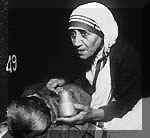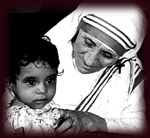


MOTHER TERESA: A SAINT BY THE YEAR 2000?
Archbishop of Calcutta Believes It is Possible
VATICAN CITY, MAR 2, 1999 (ZENIT).-
As disclosed yesterday, John Paul II has authorized Archbishop Henry Sebastian
D'Souza of Calcutta, to begin the process for the cause of beatification of Mother Teresa,
before the five years since the death of the candidate, ordinarily required to open the
process.
A diocesan tribunal must now evaluate the life and death of the Albanian religious, and
prove her sanctity. A task that could be accelerated, as Archbishop D'Souza has revealed
that two miracles, attributed to Mother Teresa's intercession, are already being examined.
It is a beatification anticipated by millions of people around the world, especially in
India
and which, coincidentally, could take place during the Jubilee of the Year 2000, the event
most awaited by Karol Wojtyla since his election to the papacy.
In India, many feel that this honor by the Church for the founder of the
Missionaries of Charity, could be a bridge between Catholics, Hindus and Moslems, given
the consensus created, even among non-believers, by the
tireless activity of this religious.
The international agency 'Fides' contacted Archbishop D'Souza for his reaction. "I am
delighted. The Pope has stepped over the whole bureaucratic procedure to open Mother
Teresa's beatification process. He had mentioned
something about it in mid-December. I alerted Sister Nirmala, the Superior of the
Missionaries of Charity, and now we have the official announcement.
In order to start the procedure, we must appoint a postulator, a lawyer, an
Episcopal delegate and several notaries to examine the documentation, which is already
vast, on the life and miracles of Mother Teresa. Individuals have sent in piles of
testimonies, letters and stories which must be ordered and
verified."
"Last year I visited the Holy Land. In Galilee, at Cana, a Palestinian woman stopped
me and said: 'You must be the Archbishop of Calcutta. I have a photograph of you and
Mother Teresa.' She went on to tell me about her granddaughter who had been gravely ill
with bone cancer," the Archbishop recounted to 'Fides.' "The night before the
little girl was to be operated on, she had a dream: a woman in a white dress trimmed with
blue said to her: 'Have no fear, you are cured.' The little girl had no idea who the woman
of
the dream could be. The next day, as the doctors were about to begin the operation, they
saw the disease had disappeared. After the miraculous cure, the little girl's family tried
to identify the lady of the dream and they discovered it was Mother Teresa," the
Archbishop said to 'Fides.'
But devotion to Mother Teresa is spreading even without miracles. 'Her life of love
dedicated to the poorest of the poor is the most beautiful sign of God's presence among
us,' the Archbishop said. Even when she was alive, 'Mother' was treated like a saint by
Christians, Hindus and Moslems.
People knelt to kiss her feet -- a typical Hindu sign of respect -- or touch her sari.
Being assisted and loved by her Missionaries of Charity, people, in turn, learned to serve
and love. Many volunteers and novices of Mother Teresa's order are people changed by an
encounter with this extraordinary
woman. 'The Pope's decision to speed up the beatification process is a sign that we have
before us an exceptional life. For the entire population of Calcutta, Mother Teresa has
always been a saint." the Archbishop said.
"Mother Teresa's burial place, at the Calcutta home of the Missionaries, has been a
site of pilgrimage since the hour of her death. Hundreds visit every day: school groups,
individuals, people from India and from all over the world. People venerate her pictures
and she is constantly invoked,
particularly by the poorest. The Archbishop continues to receive reports of miracles and
requests for prayers. "Only yesterday, I had a letter from a woman in Bombay asking
me to pray to Mother Teresa to obtain a special grace. No one organizes this movement; it
is all quite spontaneous."
Mother Teresa, appreciated and admired even by people of other religions, is an element of
unity particularly important at this time of tension between Christians and Hindu
fundamentalists. For months, there has been a harsh campaign against Christians,
especially Christian missionaries. Some extremist Hindu associations go so far as to
attack Mother Teresa and her Sisters, accusing them of forcing conversions. But the
majority of Hindus in India openly admire and love Mother Teresa. "The most
traditional
Hindu groups have criticized the position taken by fundamentalists," the Archbishop
said. "Freedom to proclaim the Gospel is part of Christianity and freedom to change
religion is written in India's Constitution."
"The grateful and loving memory of Mother Teresa is still very much alive among the
people. Everybody is ready to help her Sisters and Brothers: they get taken to the airport
or station; receive free medical care and are regularly supplied with the food and
clothing they distribute to the poor in their work," 'Fides' reports. "Their
every little need is a priority, even
for Hindus and Moslems. Not rarely inter-religious prayers are held at her tomb: without
any previous arrangement, members of various religions find themselves together and they
begin to pray. "If Mother Teresa were to be beatified in 2000, it would be a
beautiful sign of love and unity for
the entire world. The witness of this woman is a sign the whole world understands,"
Archbishop D'Souza said.
ZE99030208

|







